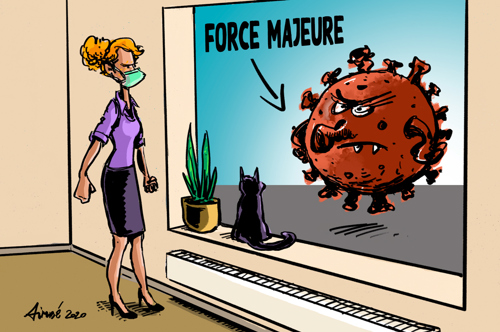- Commercial and Economic Law
- Toon Delie - Leo Peeters - Koen De Puydt
- corona , Corona virus , force majeure , agreement
What is the impact of the coronavirus on your agreements?
With the corona crisis striking in all its intensity, the legal concept of "force majeure" will be predominantly present as an essential element of any commercial relation.
Many contracts have clauses dealing with force majeure and its consequences. If no such clauses have been stipulated the law will apply.
The principles of what means “force majeure” according to the law, and its elements to consider for the application of “force majeure” are briefly explained hereafter.
1. Force majeure according to the law
According to Civil Code, a contract party cannot be held liable to pay damages, if that party is unable to fulfill its obligations due to force majeure or a coincidence.
In order to call on force majeure the following conditions should be met:
- The execution of the contractual obligation must be impossible, and
- The party who calls on force majeure may not be related to this situation.
That party, who calls on force majeure, may not have made any mistake in this respect.
We will elaborate on these two conditions below.
1.1 The impossibility to fulfill the contractual obligation
According to the most recent case law the impossibility to fulfilling the contractual obligation must be judged in a “reasonable” way.
This means that the circumstances of force majeure, the impossibility to execute, have to considered in a "human" way. Although, strictly speaking, the obligation can still be executed, its execution has become so difficult that it can no longer be expected from the contracting party to perform.
It is not excluded however that some courts require that the "impossibility" is absolute, meaning that it is totally impossible to execute the obligation.
1.2 The contract party may not be related to the force majeure situation.
The impossibility to execute a contractual obligation may not be caused by the contracting party who claims force majeure. The situation causing force majeure, must be unavoidable and unforeseeable.
The relevant contract party was not able to anticipate the force majeure situation and could not be expected to have taken appropriate measures.

2. The consequence of force majeure
In case of force majeure a contract party is released from its contractual obligation to perform, without any damages due as a result.
This also means that the other party is released from its obligations.
The latter only applies, however, if there is a definite impossibility to execute the contractual obligations.
Should the impossibility be temporarily, the parties may require to still execute the obligations, once the impossibility to execute has ceased. However, this will only be the case if the performance of the agreement is still useful.
3. Conclusion
In the context of the corona crisis, "force majeure" has suddenly become highly topical.
First the contract and more precisely the clauses regarding "force majeure" have to be analysed as well as the contractual consequences of such situation. They can be different from the law. These may deviate from the legal provisions and may even exclude certain risks completely. But keep in mind that in the present exceptional circumstances, a judge may be tempted to use his or his right to moderate.
If there is no written contract, or the contract does not contain any stipulation about force majeure, when it could apply and what should happen in case of force majeure, the law will apply. The principles have been set out here above. Some sectors may have recourse to their own specific legislation.
What do we recommend if you consider to invoke "force majeure" in the context of the corona crisis?
- first check your contracts or have them checked;
- contact your contract party and try to find a solution together or have your counsel do so;
- always remain reasonable and ethical, given the circumstances ;
- if you have any doubts, do not hesitate to contact us;
- only if no amicable solution is possible you can consider to involve the court.
Please, do not hesitate to contact us. It goes without saying, therefore, that we can assist you, first of all to assess your legal position and to consider what action you can or should take in this crisis. You can always contact us on 02/747 40 07 or CoronaTaskforce@seeds.law.










